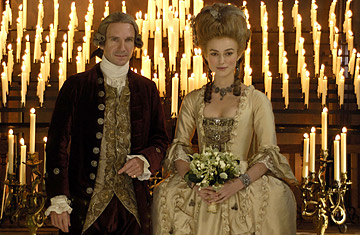
Ralph Fiennes and Keira Knightley in The Duchess
You can imagine their wedding night. The girl is required to lie back and think of England — or at least that vast portion of its acreage that is the Duke's domain. What he may be thinking of is unimaginable to us. Essentially, he is grimly standing to stud. Alas, Georgiana proves incapable for the longest time of producing male children. She is, however, capable of producing gossip. She is a fashion plate, a gambling addict, a drinker, a fiercely loving mother and, even though women did not have the franchise, a shrewd participant in Whig politics. At a certain level, The Duchess is a parable, possibly even a fantasy, about female empowerment.
Fortunately for us, however, it does not linger often or long at that level. As movies like this go — stately homes constantly arustle with the sound of lingerie falling gently to the parquet floors — it is quite a lively, and even occasionally a rather touching, piece. The Duchess takes in a young woman named Bess (Hayley Atwell) who is being abused by her brutish husband. In due course, she becomes the Duke's mistress, living more or less comfortably with the Duke and Georgiana. (It is a very big house.) Georgiana also takes a lover: a rising politician, Charles Grey (Dominic Cooper), who will one day father her out-of-wedlock child and, eventually, become prime minister.
The film is refreshingly cool about the scandalous activities it recounts. Its three screenwriters neither totally neglect nor totally embrace period language, so the dialogue has a pleasantly straightforward quality. Something similar can be said for Saul Dibb's direction. He's a relative newcomer to feature films, but he's neither overawed nor of a mind to be satirical about the stately homes his characters inhabit — or, for that matter, about their costumes, entertainments or taste in home furnishings. His manner is that of a reserved realist, and that keeps our attention focused where it should be — on the convolutions of plot and character. His actors are not distracted by the quaint or the arcane. Nor are we.
The players are uniformly good, but a special word must be said for Fiennes, whose portrayal of physical awkwardness and painful taciturnity never begs either for laughs or for sympathy. He is, to borrow the title of a touchstone modernist novel, a man without qualities, a creature who might fall over were he not propped up by the invisible scaffolding of tradition, manners and his aristocrat's utterly unexamined sense of perfect entitlement. He doesn't have to think because no one has ever asked him to, and sometimes you see in this performance a dim, sad restlessness, a desire to rectify than condition, that he cannot manage.
If thoughts of Prince Charles stray into your mind as you watch His Grace, that's your business. The same is true of Georgiana, who is the ancestor of Princess Di, except, that in the 18th century, her brain cells were not yet completely replaced by air. She conveys a nice sense of an untutored woman trying to embrace the world beyond the bounds of her class, while not being harassed by it — or by the tabloids, which existed in primitive form in those days, too.
The Duchess, however, does not insist on such analogies; they're there for you if you want to find them. Mostly it trusts the intricacies of its story to hold your interest. And it does, with casual ease and unself-conscious style and wit. It has been some time since a period piece has breathed so easily.